
Swansea Bay University Health Board Green Team Competition expected to save £33,794.65 and 4,574,021.3 kgCO2e annually
The Centre for Sustainable Healthcare (CSH) is proud to announce the remarkable outcomes of the Green Team Competition held in partnership with Swansea Bay University Health Board. The combined projects produced estimated annual savings of £33,795 and 4,574,021 kgCO2e, or the carbon footprint equivalent of 13,174,024 miles driven in an average car, or 16,676 return trips between Swansea Bay and Edinburgh.
Whilst healthcare systems have a key part to play in maintaining health in the face of the threat of climate change, the delivery of healthcare is also contributing to the problem. If healthcare were a country, it would be the 5th largest carbon emitter in the world.
In their Decarbonisation Action Plan 2022-2024, Swansea Bay University Health Board has acknowledged that climate change has a significant impact on the health and wellbeing of the planet and people. They believe that their staff can play a significant role in achieving the NHS goal of being carbon neutral by 2040 and commissioned a Green Team Competition with CSH. CSH’s facilitators, who have expertise in both healthcare and sustainability, worked directly with the six participating teams to identify, develop, run and measure outcomes of sustainable quality improvement, or 'SusQI' projects.
The teams presented their projects virtually to a judging panel, prior to coming together to celebrate their achievements at the Showcase and Awards event. The judging panel consisted of:
- Lisa Wise, Head of Health and Social Care Climate Emergency National Programme, Welsh Government
- Hazel Powel, Deputy Director of nursing and patient experience, Swansea Bay University Health Board
- Nuala Hampson, Lead Facilitator, Education Programmes, Centre for Sustainable Healthcare
The Green Team Showcase and Awards event took place at The Waterfront Museum in Swansea Bay, and was held jointly with the Hywel Dda Green Team Competition. CSH would like to thank Hayley Beharrell, Sustainability Planning Manager (Swansea Bay) and Sarah Thorne, One Health Practitioner (Hywel Dda) for their planning and hosting of this event.
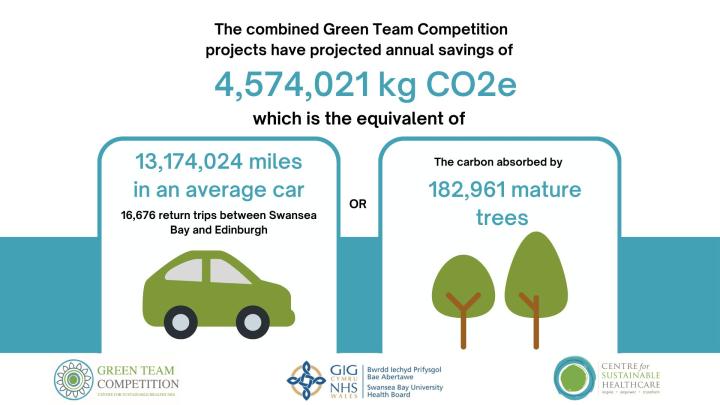
Green Team Competition Projects
Read the full Impact Report here.
1. Incorporating decarbonisation into pharmacist-led asthma clinics, Pharmacy Team
2. Collaborative report of paper lite and contrast recycling projects, Endoscopy Team
3. Reducing the carbon footprint of the Rehabilitation Engineering Unit workshop (REU), Rehabilitation Engineer Team
4. The Gloves Are Off Campaign: Reducing unnecessary non-sterile glove use in NICU/SCBU, Gloves Off Team
5. Elective Theatres Shutdown Check, Anaesthetics Team
6. Greener Feeding Practices in The Neonatal Intensive Care Unit (NICU), NICU Team
1. Incorporating decarbonisation into pharmacist-led asthma clinics, Pharmacy Team
It is estimated that Metered Dose Inhalers (MDIs) currently contribute 3.5% of the carbon footprint of the NHS. MDIs contain a propellant hydrofluoroalkane (HFA) 134a which is a potent greenhouse gas; even when these inhalers are sent to landfill the HFA’s can slowly leak out of the inhalers and contribute to global warming.
In contrast, dry powder inhalers (DPIs) and soft mist inhalers (SMIs), do not contain HFA propellants, and thus have a significantly lower carbon footprint than MDIs. A new National Prescribing Indicator (NPI) for 2022-2023 encourages a reduction in prescribing of MDI’s in favour of DPI and SMI prescribing.
Swansea Bay University Health-board (SBUHB) has approximately 70% of inhaler prescriptions prescribed as MDIs resulting in some of the highest prescribing proportions within the country (3rd highest in Wales). In contrast, there are some countries in Europe (e.g. Sweden), where only 13% of their inhaler prescriptions are prescribed as MDIs. The team recognised a need to focus attention on reducing the carbon impact of inhaler prescribing within their health-board. The ambitious goal set out by NHS Wales is to achieve an 80% prescribing rate of DPI and SMIs by 2025.
Team members:
Carys Howell, Clinical pharmacist and Respiratory Independent prescriber; Rebecca Gillman, Medicines management pharmacy technician
Method & Impact
For their project, the team set up a 10 week decarbonisation focused asthma clinic, aimed at improving asthma control and achieving the NPI target for an increase DPI and SMI prescribing. They focused on patients receiving >6 salbutamol inhalers/annum, as overuse may suggest suboptimal asthma control and is associated with the largest carbon footprint.
The team utilised the All Wales adult asthma guidelines to guide management and therapy choices:
- Switch to DPI if possible and to a lower carbon intensive MDI if a DPI is unsuitable.
- Adjust dosage regimen to reduce inhaler burden.
- Educate patient on inhaler carbon footprint and importance of inhaler recycling to community pharmacies to achieve long-term sustainability.
- Utilise MART (Maintenance and Reliever Therapy) regimes where appropriate, to reduce SABA use.
The clinic has improved asthma reviews by making them patient-centred and utilising ‘dummy’ inhalers to show patients what options they have for their asthma treatment. This involves patients in decision-making and empowers them to take control of their asthma.
Over the 10-week period, only 3 out of 29 patients were unable to switch to a DPI after assessment (10%), therefore, it could be achievable to reach a target of 80% of inhaler prescriptions prescribed as DPI’s by 2025. These patients were offered a lower carbon MDI and a spacer device for improved inhaler technique.
The project saved 379.2 kgCO2e, based on one inhaler switch for each of the 29 patients. Projected across a year, each patient will receive one inhaler per month on average, increasing the savings to 4,550.856 kgCO2e per year. This is equivalent to 13,107.3 miles driven in an average car.
Their projected savings across the health board equate to an average of 156.9 kgCO2e per patient. Swansea Bay UHB supports a population of 400,000 individuals, of which 7.2% (28,800 people) are registered with asthma (according to the primary care information portal). Assuming similar changes could be made to the full 7.2%, the team anticipates savings of up to 4,518,720 kgCO2e per year.
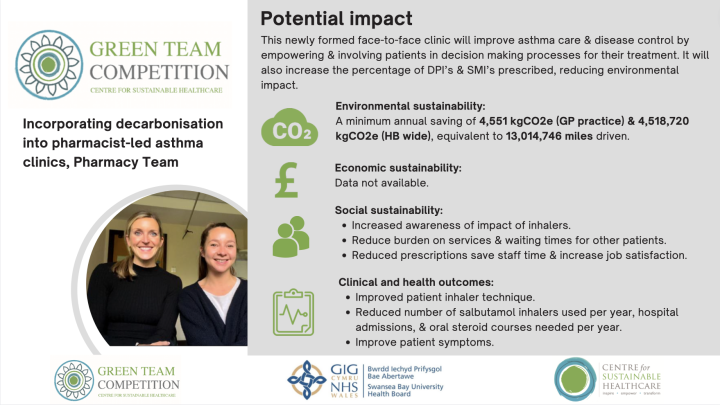
2. Collaborative report of paper lite and contrast recycling projects, Endoscopy Team
A report published by NHS Supply Chain (2020) revealed that by changing to recycled copier paper in 2019, the NHS has saved the equivalent of watching 85,503 hours of a plasma TV in energy, filling 161 Olympic size swimming pools with water, felling 20,000 trees, travelling 10 times around the world on an aeroplane in CO2. There are 3 Endoscopy Units within the SBUHB, and each unit uses a significant amount of paper. Although the team already used recycled paper in all units, they believed they could reduce their printing and paper usage.
Contrast is also used in the endoscopy unit for procedures that require x-ray input. The team targeted both paper and contrast waste to improve their carbon footprint.
Team members:
Sarah Owens, Clinical Endoscopist; Nicola Harvey, Unit Manager (Sister); Mark Hillier, Trainee Clinical Endoscopist; Sandra John-Cox, Matron of Medicine; Imran Rao, Service improvement lead for endoscopy
Method & Impact
1. Paper reduction project:
a) Patient information leaflets: Post-procedures, patient follow up advice is provided. The team proposed switching paper leaflets for already established online leaflets. By changing practices, the team can save approximately 4.047 kgCO2e per week.
b) Endoscopy reports: The team printed multiple reports of up to 10 pages following each procedure. Through meetings with the team and senior management, it is possible to reduce the number of pages printed per report, and to send some copies electronically. The anticipated a reduction of 7-8 pages printed per endoscopy report is equivalent to an average of 450 double sided pages saved per day. The savings per week is approximately 63.9 kgCO2e.
c) Patient questionnaires: Patient feedback post-procedure was previously collected via printed questionnaires. The team identified that by switching to electronic questionnaires, they can save 6 pieces of A4 double sided printing per questionnaire (360 pieces of paper per day), which is 49.87 kgCO2e per week. They accounted for the CO2e in use of an iPad to calculate their savings.
2. Recycling of contrast:
Previously contrast waste from Endoscopy procedures was disposed of in sharps bins and incinerated. The team has recently established a contrast recycling process giving contrast back to their supplier as they deliver new contrast. An estimated 375 ml of contrast per week is being redirected, a reduction of 19.5kg / year, equating to a saving of 21 kg CO2e / year.
The teams project combined will save 6,147.48 kg CO2e per year, equivalent to driving 17,705.9 miles in an average car, and an annual saving of £548.
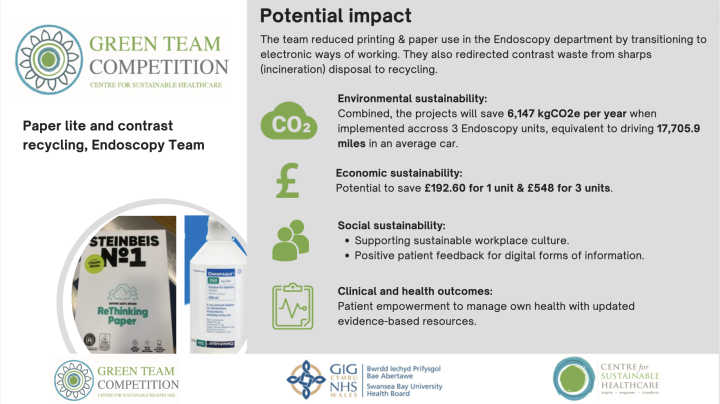
3. Reducing the carbon footprint of the Rehabilitation Engineering Unit workshop (REU), Rehabilitation Engineer Team
The REU has in-house manufacturing facilities for creating bespoke devices using materials such as foam, metal, wood, and plastic for postural support and pressure relief.
As a department, the team had already implemented many changes to improve sustainability of their service, such as utilising virtual ways of working, reducing and grouping in person visits geographically, returning old wheelchairs and accessories to the Cardiff Posture and Mobility Centre and good engineering practices aiming to minimise material waste.
One of the barriers to reducing waste in the department is that the devices developed are highly bespoke to the service user and are rarely re-issued to another service user. In addition, the materials used are often ‘non-recyclable’ due to their plastic content, which makes it more difficult to recycle waste into its original state.For their project, the team aimed to reduce non-recyclable content by switching to use of more sustainable materials, and to reduce waste to landfill by recycling materials.
Team members:
Jacob Redwood-Thomas, Rehabilitation Engineer; Benjamin Lee, Rehabilitation Engineer
Method & Impact
The team focused on custom moulded seating systems for their project, and identified three methods of reducing the carbon footprint:
- Switching to an eco-friendlier plastic that can be used instead of ABS plastic such as Polypropylene.
- Collection of white foam offcuts by their supplier, so they can be recycled into new products such as chipfoam or carpet underlay.
- Sourcing materials closer to the department to save on CO2 emitted from delivering the materials.
To manufacture 37 custom moulded seating systems, in the past 18 months, the team has ordered 310.962kg of ABS. With a lower density, the total weight of Polypropylene would be 263.016kg, and could save 353.867kg CO2e. Collection of offcut white foam for recycling, can save 38.38kg CO2e.
Combining the two changes, the team has a total saving of 392.247kgCO2e, the equivalent to 1,129.7 miles driven in an average car.
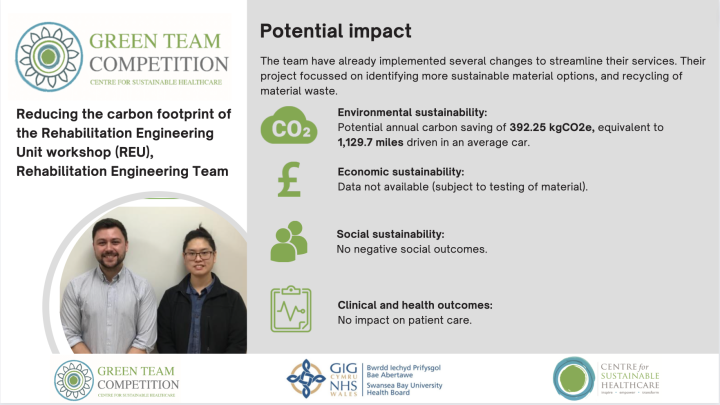
4. The Gloves Are Off Campaign: Reducing unnecessary non-sterile glove use in NICU/SCBU, Gloves Off Team
During the COVID-19 pandemic, between Feb 2020 and Feb 2021, over 8.7 billion items of PPE were distributed to health and social care services in England, compared to approximately 2.43 billion items in 2019. The Gloves Off Team aimed to reduce the unnecessary use of non- sterile gloves within NICU departments to:
- Improve hand hygiene practices and reduce cross contamination stemming from the overuse of non-sterile gloves.
- Reduce the environmental impact (CO2e) of the NICU.
Team members:
Naomi Oxberry, Dietician and Medical Student at University of Swansea; Amber O’Cliffe, Medical Student at University of Swansea
Method & Impact
The team used the validated glove audit tool to obtain baseline data on how non-sterile gloves were used in the department. Based on audit data and research, a training video was developed to outline the problems with non-sterile gloves regarding infection and cross contamination, update members of staff on what the NHS guidelines are for glove use, outside of the COVID-19 pandemic and to share the results of their audit data. The team then repeated the audit to calculate a percentage reduction in unnecessary glove use with the same audit tool.
Following the intervention, a 55.41% reduction in glove use was observed, equating to 4,986 less gloves being used per month. In addition, there were less instances of cross contamination, with the average number of items touched before the patient or a key site was 4.6 times whereas after the intervention it was 0.4 times.
Projected across a year, 1,555.6 kgCO3e could be saved, equivalent to driving 4,480.4 miles in an average car, along with financial savings of £6,480.
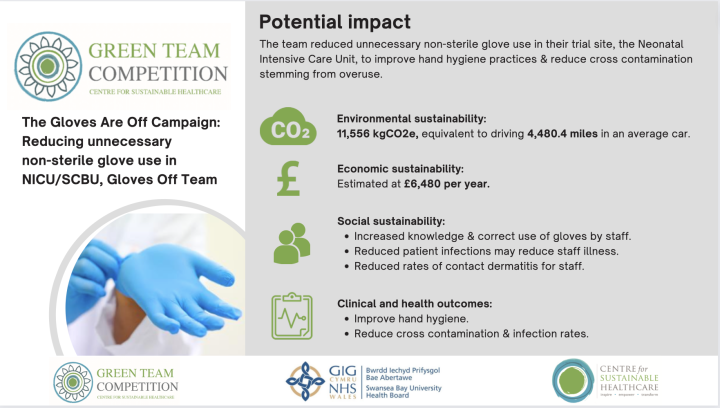
5. Elective Theatres Shutdown Check, Anaesthetics Team
Hospital operating theatres are highly specialised areas. They utilise powerful, high turnover ventilation systems, high level lighting and many electrical devices. Planned operating usually takes place during daytime hours and during the working week only, while emergency operating occurs around the clock. Therefore, the majority of these devices will not be used for most of the time.
For their project, the team aimed to effect a behaviour change among staff, making the switching off of equipment at the end of the day second nature, increasing staff morale and resulting in carbon and financial savings.
Team members:
Dr Elana Owen, Consultant Anaesthetist; Dr Christine Range, Consultant Anaesthetist; Gemma Hale, Operating Department Practitioner
Method & Impact
- Audit: The team made a list of devices that can be turned off daily in elective operating theaters and created a "shutdown" list poster to promote the health board's goal of being carbon-neutral.
- Staff engagement: The team had discussions with theater staff and senior management, who supported the initiative. Some machines need to be turned off and on again to activate their morning self-check, making the end-of-day shut-off routine not an increase in workload.
- Repeat Audit: reviewed equipment use after staff engagement.
By switching off all eligible computers, anaesthetic machines, and anaesthetic gas scavenging, the team anticipated a potential saving of 44,774 kg CO2e per year, equivalent to driving 128,957.6 miles in an average car. Additionally the health board could save £26,000 annually (not including computers).
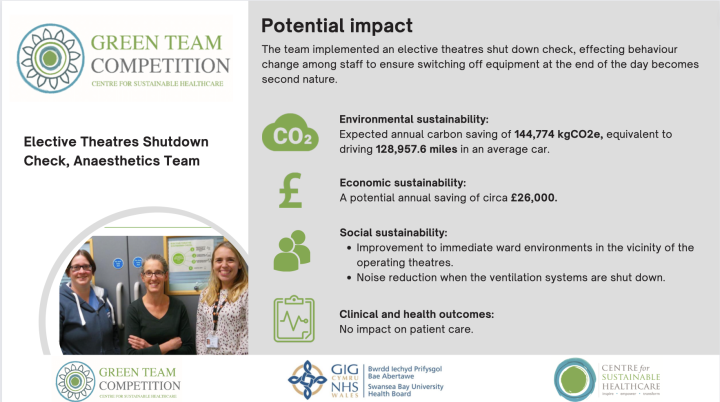
6. Greener Feeding Practices in The Neonatal Intensive Care Unit (NICU), NICU Team
Family Integrated Care (FICare) is a model of neonatal care which promotes a culture of partnership between families and staff. It aims to prevent mortality and morbidity associated with needing neonatal care through involving parents-as-partners in care, giving them more responsibility for the management of their infants' health and care. It also promotes many low carbon practices i.e. parental presence in the unit, reducing travel between home and hospital, breastfeeding, skin-to-skin to encourage thermal care.
The NICU team aimed to integrate these principles into their sustainability project by focusing on feeding as it forms a huge part of the family journey through the neonatal unit and is an opportunity for bonding between parents and their baby. Infants born premature and/or with health complications often experience difficulties feeding and take time to achieve full oral feeding. While breastfeeding is promoted for all infants, many will also require bottle feeding. It is common practice to use single use teats and bottles for these feeds, despite infants and families needing to transitioning to reusable, commercially available bottles on discharge.
Team members:
Katherine Burke, Neonatal Consultant; Sharon Birch, Staff Nurse
on behalf of the Neonatal Team at Singleton Hospital
Method & Impact
For their project the team aimed to:
- Support parents to use own bottles/increasing use of reusable bottles: developed and introduced parental written resources to the unit added to their pathways to inform parents about providing their own feeding equipment (bottles and teats). The team emphasised patient benefits of this and provided written information to parents, ‘rapid’ staff education and embedded reminders in our daily safety huddles.
- Recycle feeding equipment: previously, all feeding bottles were disposed of in clinical waste. If rinsed, these can be recycled as per the health board waste pathway. The team has been establishing infrastructure for recycling plastic waste associated with feeding on the unit and raised awareness of what can be recycled to all staff.
The proportion of infants receiving oral feeds via a parent-provided bottle increased considerably, by 92% over a 2 week period. The team are still in the process of identifying the carbon footprint of one disposable bottle versus a reusable bottle, however anticipate the project will lead to significant CO2e savings in the NICU.
Recycling of feeding equipment anticipate savings of 2,452.96 kgCO2e per year, equivalent to 7,065 miles driven in an average car, and savings of £766.65 annually.
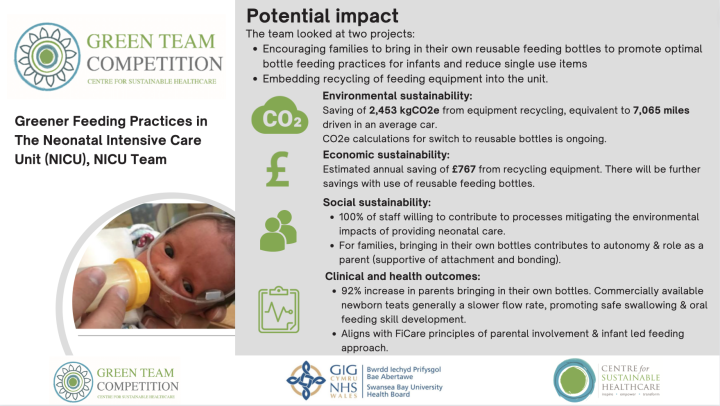
Awards
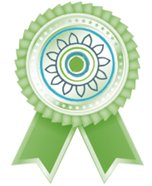 On February 3rd, Swansea Bay and Hywel Dda University Health Boards co-hosted the Showcase and Awards Ceremony at The Waterfront Museum in Swansea
On February 3rd, Swansea Bay and Hywel Dda University Health Boards co-hosted the Showcase and Awards Ceremony at The Waterfront Museum in Swansea
The Pharmacy Team were announced winners of the Swansea Bay University Health Board Green Team Competition, for their development of an inhaler decarbonisation clinic. The Health Board selected the Anaesthetics and NICU teams as joint highly commended.
The outstanding results of the competition once again demonstrates that running a Green Ward project creates strong interdisciplinary relationships between clinical and non-clinical departments. Staff also reported feeling both valued and empowered to actively make further changes in their team and service and to advocate for sustainable healthcare practices.

